You are using an out of date browser. It may not display this or other websites correctly.
You should upgrade or use an alternative browser.
You should upgrade or use an alternative browser.
[🇧🇩] India's Water Terrorism Against Bangladesh
- Thread starter Saif
- Start date
More options
Manage feed entriesSaif
Senior Member
- Joined
- Jan 24, 2024
- Messages
- 16,790
- Likes
- 8,152
- Nation

- Residence

- Axis Group

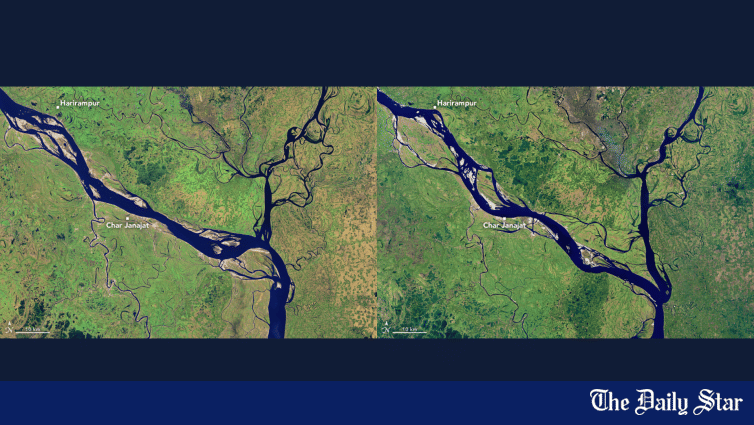
Here’s how NASA scientists study the Padma river
The Padma—a lifeline for thousands of people but also a force for change with far-reaching effects on those who live along its banks, flows through the centre of Bangladesh. Its flowing form has shaped and reshaped the terrain it passes through for decades, defying permanence. Now, satellite...
Here’s how NASA scientists study the Padma river
Images of the Padma from NASA's Landsat. Image: NASA Earth Observatory
The Padma—a lifeline for thousands of people but also a force for change with far-reaching effects on those who live along its banks, flows through the centre of Bangladesh. Its flowing form has shaped and reshaped the terrain it passes through for decades, defying permanence.
Now, satellite imagery from NASA's Earth Observatory research lab reveals the Padma's dynamic nature, illustrating its growth, meanders, and shifting course over the past 30 years. In a recent blog post, NASA Earth Observatory revealed that Landsat images from 1944-2018 help scientists measure erosion on the Padma river and note differences in the river's width, depth, shape, and overall appearance. "Like parents measuring a child's height, scientists measure erosion on the Padma River by noting differences in its width, depth, shape, and overall appearance," read the blog post.
Landsat satellites, specifically the Thematic Mapper on Landsat 5, the Enhanced Thematic Mapper Plus on Landsat 7, and the Operational Land Imager on Landsat 8, were used for capturing the photos. To emphasise the distinctions between land and water, they use a mix of visible light, near infrared, and shortwave infrared light.
The river's constant evolution poses challenges for those who depend on it for transport and agriculture. Erosion along its 130-kilometre shoreline has claimed swathes of land, displacing communities and altering the region's geography. Since 1967, over 66,000 hectares (256 square miles) of land have eroded and have fallen into the Padma river, according to Earth Observatory which shares information from NASA research.
Sedimentation is one of the main reasons behind the change in water flow. One theory suggests that sedimentation, triggered by seismic events like the 1950 earthquake, has highly influenced its course.
Over the last thirty years, the river has changed its shape a lot. It used to be narrow and straight, but now it meanders, braids, and then goes back to being straight again. The biggest change happened near the Harirampur upazila area, where there was a lot of erosion. In 1998, a big flood made this erosion worse, especially because India's Farakka barrage (dam) released more water into Bangladesh, according to Earth Observatory.
Researchers are also interested in the Char Janajat area, where the Padma Bridge was constructed. Near Char Janajat, the river made bends and eroded the land. The bends were most extreme from 1995 to 1996. They started forming in 1992, decreased by 2002, and now they're gone.
Saif
Senior Member
- Joined
- Jan 24, 2024
- Messages
- 16,790
- Likes
- 8,152
- Nation

- Residence

- Axis Group

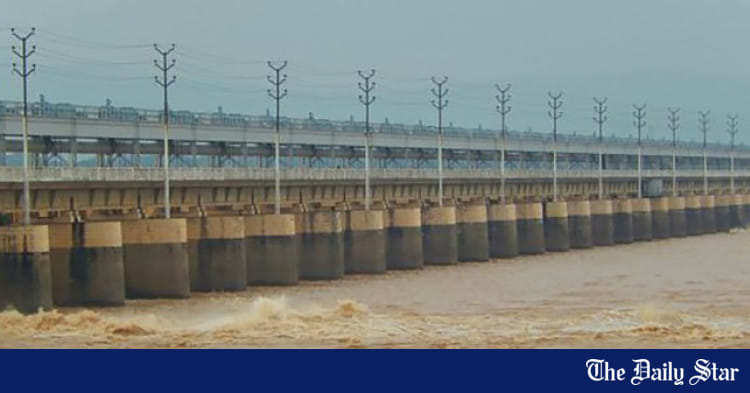
Int'l Farakka Committee urges Dhaka, Delhi to renew Ganges treaty
It also calls for signing new treaty on Teesta
Int'l Farakka Committee urges Dhaka, Delhi to renew Ganges treaty
It also calls for signing new treaty on Teesta

Farakka Barrage. Photo: Collelcted
The International Farakka Committee today urged Dhaka and Delhi to renew the Ganges Water Sharing Treaty and sign a treaty on the Teesta with guarantee and arbitration clauses.
Announcing a joint statement today at the Jatiya Press Club in Dhaka, Prof Jasim Uddin Ahmed, president of the International Farakka Committee, Bangladesh said that the 54 common rivers shared among the countries could be sustainably developed only based on a basin-wide agreement.
Farakka Barrage. Photo: Collelcted
The International Farakka Committee today urged Dhaka and Delhi to renew the Ganges Water Sharing Treaty and sign a treaty on the Teesta with guarantee and arbitration clauses.
Announcing a joint statement today at the Jatiya Press Club in Dhaka, Prof Jasim Uddin Ahmed, president of the International Farakka Committee, Bangladesh said that the 54 common rivers shared among the countries could be sustainably developed only based on a basin-wide agreement.
The press briefing was also addressed by Mostafa Kamal Majumder, convener, IFC, Sirajuddin Sathi, writer and researcher, Tamijuddin Ahmed, Dr. Nazma Ahmad, vice president of IFC Bangladesh, and journalist Rafiqul Islam Azad.
The statement mentioned that the water treaties signed by India with other countries of the subcontinent - Nepal and Pakistan - contain guarantee and arbitration clauses.
As a result, the Indus and Mahakali water treaties have been able to protect mutual interests. On the other hand, the Ganga Water Treaty signed with Bangladesh has not fulfilled the terms.
Because of this error, the relationship between the two friendly countries did not develop as expected.
The Farakka Barrage on the Ganges was commissioned in consultation with Bangladesh, on a trial basis for a total of 41 days from 21 April to 31 May 1975. But since then, unilateral water withdrawals continued and environmental disasters occurred in Bangladesh.
Later in 1977, a five-year water treaty was signed with a guarantee clause of 80 percent water availability. But after the expiry of this treaty, instead of renewing it, a 5-year memorandum of understanding was signed in 1982, minus the guarantee clause.
A 30-year treaty was signed in 1996 for the sharing of Ganges water. The treaty will expire in 2026. Thus, Bangladesh Foreign Minister Dr Hasan Mahmud, during his recent visit to Delhi, urged for the renewal of this treaty and the signing of the Teesta Water Treaty.
Bangladesh did not get water according to the terms of this Ganges Treaty. Nor could it take any effective action on it, because the treaty did not have guarantee and arbitration clauses. This weakness of the treaty must be overcome at the time of renewal.
The agreement on Teesta was supposed to be signed in 2011 during the visit of Indian Prime Minister Man Mohan Singh to Bangladesh. But due to West Bengal Chief Minister Mamata Banerjee, it has been kept undone till date.
During the dry season, no water from Teesta river is released to Bangladesh. A small amount of water comes to Bangladesh as seepage from Ghazal Doba Barrage in West Bengal.
During the wet season on the other hand due to the full release of floodwaters, thousands of houses are destroyed and massive crop losses occur in the Teesta basin of Bangladesh every year due to severe deluge and bank erosion.
The statement says Bangladesh owes its origin to the river. Therefore, the question of life and death of the people of Bangladesh is associated with the flow of the river. So far, unilateral water withdrawal has increased with the construction of dams in Teesta and other common rivers.
These natural water sources are being killed by altering their courses for short-term benefit by short-sighted damming, it added.
The statement mentioned that the water treaties signed by India with other countries of the subcontinent - Nepal and Pakistan - contain guarantee and arbitration clauses.
As a result, the Indus and Mahakali water treaties have been able to protect mutual interests. On the other hand, the Ganga Water Treaty signed with Bangladesh has not fulfilled the terms.
Because of this error, the relationship between the two friendly countries did not develop as expected.
The Farakka Barrage on the Ganges was commissioned in consultation with Bangladesh, on a trial basis for a total of 41 days from 21 April to 31 May 1975. But since then, unilateral water withdrawals continued and environmental disasters occurred in Bangladesh.
Later in 1977, a five-year water treaty was signed with a guarantee clause of 80 percent water availability. But after the expiry of this treaty, instead of renewing it, a 5-year memorandum of understanding was signed in 1982, minus the guarantee clause.
A 30-year treaty was signed in 1996 for the sharing of Ganges water. The treaty will expire in 2026. Thus, Bangladesh Foreign Minister Dr Hasan Mahmud, during his recent visit to Delhi, urged for the renewal of this treaty and the signing of the Teesta Water Treaty.
Bangladesh did not get water according to the terms of this Ganges Treaty. Nor could it take any effective action on it, because the treaty did not have guarantee and arbitration clauses. This weakness of the treaty must be overcome at the time of renewal.
The agreement on Teesta was supposed to be signed in 2011 during the visit of Indian Prime Minister Man Mohan Singh to Bangladesh. But due to West Bengal Chief Minister Mamata Banerjee, it has been kept undone till date.
During the dry season, no water from Teesta river is released to Bangladesh. A small amount of water comes to Bangladesh as seepage from Ghazal Doba Barrage in West Bengal.
During the wet season on the other hand due to the full release of floodwaters, thousands of houses are destroyed and massive crop losses occur in the Teesta basin of Bangladesh every year due to severe deluge and bank erosion.
The statement says Bangladesh owes its origin to the river. Therefore, the question of life and death of the people of Bangladesh is associated with the flow of the river. So far, unilateral water withdrawal has increased with the construction of dams in Teesta and other common rivers.
These natural water sources are being killed by altering their courses for short-term benefit by short-sighted damming, it added.
Saif
Senior Member
- Joined
- Jan 24, 2024
- Messages
- 16,790
- Likes
- 8,152
- Nation

- Residence

- Axis Group

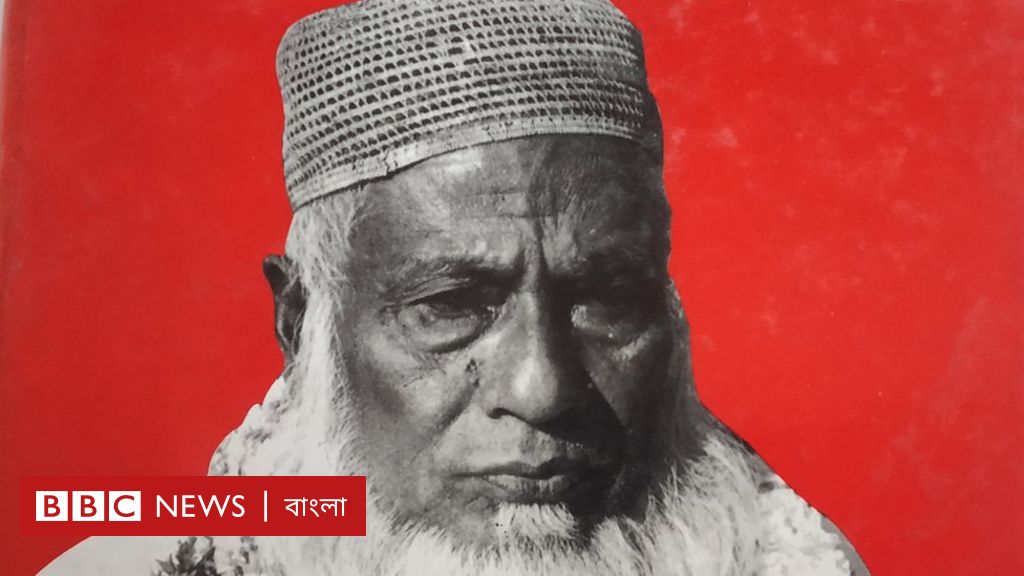
মাওলানা ভাসানী যেভাবে ফারাক্কা অভিমুখে লংমার্চ করেছিলেন - BBC News বাংলা
উনিশশো ছিয়াত্তরের এপ্রিল মাসে হাসপাতাল থেকে ফিরে মাওলানা ভাসানী ঘোষণা দেন ভারত বাংলাদেশকে পানির অধিকার থেকে বঞ্চিত করলে ফারাক্কা অভিমুখে লংমার্চ করবেন। এই কর্মসূচী অনেককে চমকে দিয়েছিল। নব্বই বছর বয়সে তো একজন মানুষের ঘরে থাকার কথা।
ফারাক্কা: মাওলানা আবদুল হামিদ খান ভাসানীর ৯০ বছর বয়সে এক লংমার্চে নেতৃত্ব দেয়ার গল্প
- আকবর হোসেন
- বিবিসি বাংলা, ঢাকা
১৬ মে ২০২২
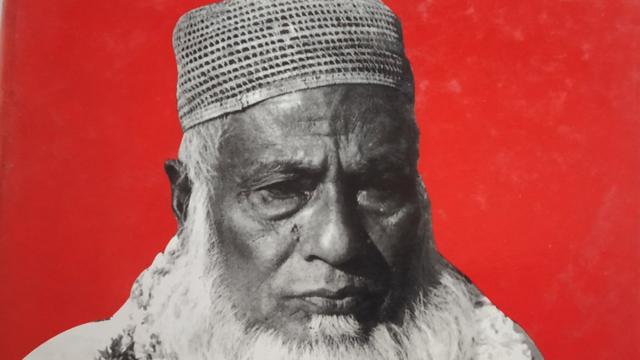
ছবির উৎস,মাওলানা ভাসানী স্মারক সংকলন বই
ছবির ক্যাপশান,
মাওলানা আব্দুল হামিদ খান ভাসানী
উনিশশো পঁচাত্তর সালের গোড়ার কথা। পাকিস্তানের কাছ থেকে স্বাধীনতা লাভের কয়েক বছরের মধ্যেই বাংলাদেশের পরিবেশ এবং প্রতিবেশের জন্য বড় এক অন্ধকার এসে হাজির হয়। বাংলাদেশের চাঁপাইনবাবগঞ্জ সীমান্ত থেকে ভারতের ১৮ কিলোমিটার ভেতরে গঙ্গা নদীর উপর একটি বাঁধ নির্মাণ করে ভারত। যেটি ফারাক্কা বাঁধ নামে পরিচিত।
এই বাঁধের প্রভাবে শুকনো মৌসুমে বাংলাদেশের দক্ষিণ-পশ্চিমাঞ্চলে পানির জন্য হাহাকার তৈরি হয়।
কলকাতা বন্দরের নাব্যতা রক্ষার যুক্তি দেখিয়ে ভারত এই ব্যারেজ নির্মাণ করে। ফলে বাংলাদেশে এর বিরূপ প্রভাব পড়ে। বাংলাদেশের দক্ষিণ-পশ্চিমাঞ্চলে এর ক্ষতিকর প্রভাব পড়ে।
উনিশশো ছিয়াত্তর সালের ১৬ই মে ফারাক্কা বাঁধের বিরুদ্ধে চাঁপাইনবাবগঞ্জ সীমান্তের দিকে একটি মিছিলের আয়োজন করেন বাংলাদেশের সুপরিচিত রাজনীতিবিদ মাওলানা আব্দুল হামিদ খান ভাসানী।
এই মিছিল ও সমাবেশ 'ফারাক্কা লংমার্চ' হিসেবে পরিচিত।
ছবির ক্যাপশান,
মাওলানা আব্দুল হামিদ খান ভাসানী
উনিশশো পঁচাত্তর সালের গোড়ার কথা। পাকিস্তানের কাছ থেকে স্বাধীনতা লাভের কয়েক বছরের মধ্যেই বাংলাদেশের পরিবেশ এবং প্রতিবেশের জন্য বড় এক অন্ধকার এসে হাজির হয়। বাংলাদেশের চাঁপাইনবাবগঞ্জ সীমান্ত থেকে ভারতের ১৮ কিলোমিটার ভেতরে গঙ্গা নদীর উপর একটি বাঁধ নির্মাণ করে ভারত। যেটি ফারাক্কা বাঁধ নামে পরিচিত।
এই বাঁধের প্রভাবে শুকনো মৌসুমে বাংলাদেশের দক্ষিণ-পশ্চিমাঞ্চলে পানির জন্য হাহাকার তৈরি হয়।
কলকাতা বন্দরের নাব্যতা রক্ষার যুক্তি দেখিয়ে ভারত এই ব্যারেজ নির্মাণ করে। ফলে বাংলাদেশে এর বিরূপ প্রভাব পড়ে। বাংলাদেশের দক্ষিণ-পশ্চিমাঞ্চলে এর ক্ষতিকর প্রভাব পড়ে।
উনিশশো ছিয়াত্তর সালের ১৬ই মে ফারাক্কা বাঁধের বিরুদ্ধে চাঁপাইনবাবগঞ্জ সীমান্তের দিকে একটি মিছিলের আয়োজন করেন বাংলাদেশের সুপরিচিত রাজনীতিবিদ মাওলানা আব্দুল হামিদ খান ভাসানী।
এই মিছিল ও সমাবেশ 'ফারাক্কা লংমার্চ' হিসেবে পরিচিত।
কেমন ছিল সেই 'ফারাক্কা লং মার্চ'?
মাওলানা ভাসানীর দীর্ঘ রাজনৈতিক জীবনে একটি উল্লেখযোগ্য ঘটনা হচ্ছে 'ফারাক্কা লং মার্চ' সংগঠিত করা।
মাওলানা আব্দুল হামিদ খান ভাসানী যখন ফারাক্কা লং মার্চের নেতৃত্ব দেন তখন তার বয়স ৯০ বছরের বেশি।
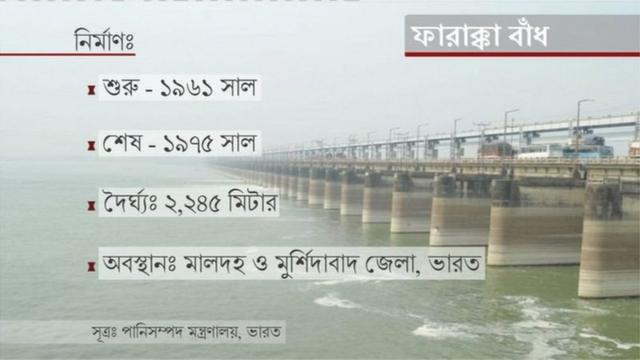
ছবির উৎস,BBC
উনিশশো ছিয়াত্তর সালের গোড়ার দিকে মাওলানা ভাসানী বার্ধক্যজনিত অসুস্থতার কারণে হাসপাতালে চিকিৎসাধীন ছিলেন।
ছিয়াত্তরের ১৮ই এপ্রিল হাসপাতাল থেকে ফেরার পর মাওলানা ভাসানী ঘোষণা দেন ভারত যদি বাংলাদেশকে পানির অধিকার থেকে বঞ্চিত করে তাহলে তিনি লংমার্চ করবেন।
তাঁর এই কর্মসূচী তখন অনেককে বেশ চমকে দিয়েছিল।
কারণ ৯০ বছরের একজন মানুষের ঘরেই থাকার কথা।
এজন্য ১৬ই মে রাজশাহী শহর থেকে লংমার্চ করার ঘোষণা দেন তিনি।
কর্মসূচী বাস্তবায়নের জন্য ১৯৭৬ সালের ২রা মে মাওলানা ভাসানীকে প্রধান করে ৩১ সদস্যবিশিষ্ট 'ফারাক্কা মিছিল পরিচালনা জাতীয় কমিটি' গঠিত হয়। এর পরে এই কমিটির সদস্য সংখ্যা আরো বৃদ্ধি পায়।
এই লংমার্চের আগে ভারতের তৎকালীন প্রধানমন্ত্রী ইন্দিরা গান্ধীর কাছে একটি চিঠি লিখেন আব্দুল হামিদ খান ভাসানী।
সে চিঠিতে মিসেস গান্ধির কাছে লংমার্চের কারণ বর্ণনা করেন ভাসানী।
সাংবাদিক এনায়েতউল্লাহ খান, আনোয়ার জাহিদ এবং সিরাজুল হোসেন খান এ চিঠি তৈরি করতে আব্দুল হামিদ খান ভাসানীকে সহায়তা করেন।
লংমার্চ সফল করার জন্য ১৯৭৬ সালের ২৮শে এপ্রিল মাওলানা ভাসানী এক বিবৃতিতে সকলের প্রতি আহবান জানান।
উনিশশো ছিয়াত্তর সালের গোড়ার দিকে মাওলানা ভাসানী বার্ধক্যজনিত অসুস্থতার কারণে হাসপাতালে চিকিৎসাধীন ছিলেন।
ছিয়াত্তরের ১৮ই এপ্রিল হাসপাতাল থেকে ফেরার পর মাওলানা ভাসানী ঘোষণা দেন ভারত যদি বাংলাদেশকে পানির অধিকার থেকে বঞ্চিত করে তাহলে তিনি লংমার্চ করবেন।
তাঁর এই কর্মসূচী তখন অনেককে বেশ চমকে দিয়েছিল।
কারণ ৯০ বছরের একজন মানুষের ঘরেই থাকার কথা।
এজন্য ১৬ই মে রাজশাহী শহর থেকে লংমার্চ করার ঘোষণা দেন তিনি।
কর্মসূচী বাস্তবায়নের জন্য ১৯৭৬ সালের ২রা মে মাওলানা ভাসানীকে প্রধান করে ৩১ সদস্যবিশিষ্ট 'ফারাক্কা মিছিল পরিচালনা জাতীয় কমিটি' গঠিত হয়। এর পরে এই কমিটির সদস্য সংখ্যা আরো বৃদ্ধি পায়।
এই লংমার্চের আগে ভারতের তৎকালীন প্রধানমন্ত্রী ইন্দিরা গান্ধীর কাছে একটি চিঠি লিখেন আব্দুল হামিদ খান ভাসানী।
সে চিঠিতে মিসেস গান্ধির কাছে লংমার্চের কারণ বর্ণনা করেন ভাসানী।
সাংবাদিক এনায়েতউল্লাহ খান, আনোয়ার জাহিদ এবং সিরাজুল হোসেন খান এ চিঠি তৈরি করতে আব্দুল হামিদ খান ভাসানীকে সহায়তা করেন।
লংমার্চ সফল করার জন্য ১৯৭৬ সালের ২৮শে এপ্রিল মাওলানা ভাসানী এক বিবৃতিতে সকলের প্রতি আহবান জানান।
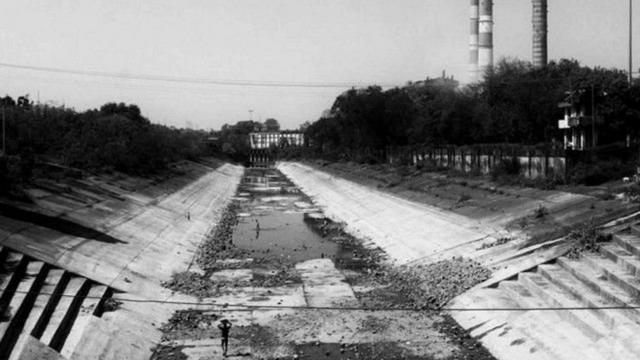
ছবির উৎস,RONNY SEN
ছবির ক্যাপশান,
১৯৭৫-এ যখন ফারাক্কাতে গঙ্গার ওপর বাঁধ নির্মাণের কাজ চলছে
জাতীয় কৃষক সমিতির আবু নোমান খান সে লংমার্চ সম্পর্কে বিস্তারিত বিবরণ তুলে ধরেছেন মজলুম জননেতা: মাওলানা ভাসানী স্মারক সংকলন' বইতে।
মি. খান লিখেছেন, লংমার্চের মিছিল রাজশাহী থেকে প্রেমতলী, প্রেমতলী থেকে চাঁপাইনবাবগঞ্জ, চাঁপাইনবাবগঞ্জ থেকে মনকষা এবং মনকষা থেকে শিবগঞ্জ পর্যন্ত ৬৪ মাইল অতিক্রম করবে।
মাওলানা ভাসানীর অনুসারীরা তাকে একজন রাজনীতিবিদের চেয়ে 'দার্শনিক' হিসেবেই বেশি বিবেচনা করতেন।
তার সমর্থকরা মনে করেন, ৪৫ বছর আগে ফারাক্কা বাঁধ সম্পর্কে মাওলানা ভাসানী যা অনুমান করেছিলেন, পরবর্তীতে সেটিই ঘটেছে।
বাংলাদেশের একজন লেখক আহমদ ছফাকে উদ্ধৃত করে ১৯৯৫ সালে দৈনিক ভোরের কাগজে ফরহাদ মজহার লিখেছেন, "বাংলাদেশের সর্বনাশ ঘটছে এটা তার চেয়ে স্পষ্ট করে কেউই বোঝে নাই।"
উনিশশো ছিয়াত্তর সালের ১৬ ই মে রাজশাহী শহর থেকে ফারাক্কা অভিমুখে মিছিল শুরু হয়। হাজার-হাজার মানুষ সমবেত হয় সেই মিছিল ও জনসভায়।
সে সময় বাংলাদেশ বেতার রাজশাহী কেন্দ্রের বার্তা বিভাগে কর্মরত ছিলেন হাসান মীর। তার বাড়িও রাজশাহীতে।
মি. মীর তখন লংমার্চের ঘটনা প্রত্যক্ষ করেছেন।
তিনি বিবিসি বাংলাকে বলেন, সাংগঠনিক তৎপরতা জোরদার করতে দুই-তিন দিন আগেই তিনি মাওলানা ভাসানী রাজশাহী এসে পৌঁছান।
ছবির ক্যাপশান,
১৯৭৫-এ যখন ফারাক্কাতে গঙ্গার ওপর বাঁধ নির্মাণের কাজ চলছে
জাতীয় কৃষক সমিতির আবু নোমান খান সে লংমার্চ সম্পর্কে বিস্তারিত বিবরণ তুলে ধরেছেন মজলুম জননেতা: মাওলানা ভাসানী স্মারক সংকলন' বইতে।
মি. খান লিখেছেন, লংমার্চের মিছিল রাজশাহী থেকে প্রেমতলী, প্রেমতলী থেকে চাঁপাইনবাবগঞ্জ, চাঁপাইনবাবগঞ্জ থেকে মনকষা এবং মনকষা থেকে শিবগঞ্জ পর্যন্ত ৬৪ মাইল অতিক্রম করবে।
মাওলানা ভাসানীর অনুসারীরা তাকে একজন রাজনীতিবিদের চেয়ে 'দার্শনিক' হিসেবেই বেশি বিবেচনা করতেন।
তার সমর্থকরা মনে করেন, ৪৫ বছর আগে ফারাক্কা বাঁধ সম্পর্কে মাওলানা ভাসানী যা অনুমান করেছিলেন, পরবর্তীতে সেটিই ঘটেছে।
বাংলাদেশের একজন লেখক আহমদ ছফাকে উদ্ধৃত করে ১৯৯৫ সালে দৈনিক ভোরের কাগজে ফরহাদ মজহার লিখেছেন, "বাংলাদেশের সর্বনাশ ঘটছে এটা তার চেয়ে স্পষ্ট করে কেউই বোঝে নাই।"
উনিশশো ছিয়াত্তর সালের ১৬ ই মে রাজশাহী শহর থেকে ফারাক্কা অভিমুখে মিছিল শুরু হয়। হাজার-হাজার মানুষ সমবেত হয় সেই মিছিল ও জনসভায়।
সে সময় বাংলাদেশ বেতার রাজশাহী কেন্দ্রের বার্তা বিভাগে কর্মরত ছিলেন হাসান মীর। তার বাড়িও রাজশাহীতে।
মি. মীর তখন লংমার্চের ঘটনা প্রত্যক্ষ করেছেন।
তিনি বিবিসি বাংলাকে বলেন, সাংগঠনিক তৎপরতা জোরদার করতে দুই-তিন দিন আগেই তিনি মাওলানা ভাসানী রাজশাহী এসে পৌঁছান।
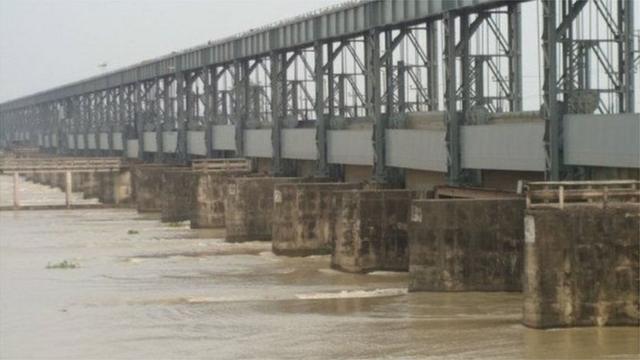
ছবির উৎস,বিবিসি
ছবির ক্যাপশান,
ফারাক্কায় গঙ্গার ওপর বাঁধ
হাসান মীরের বর্ণনায়, "রাজশাহী শহরে তখন অচেনা মানুষের ভিড়। লংমার্চে অংশ নিতে দেশের বিভিন্ন এলাকা থেকে সর্বস্তরের মানুষ আসছে। রাস্তায় রাস্তায় লাউড স্পিকারে ঘোষণা হচ্ছে - ১৬ই মে রোববার মাদ্রাসা মাঠ থেকে লংমার্চ শুরু করবে। বাসা থেকে বেতার ভবনে যাওয়ার সময় দেখলাম পথঘাট লোকে লোকারণ্য। বিশাল মাদ্রাসা মাঠে ভীড় উপচে পড়ছে। "
সেই লংমার্চের খবর সংগ্রহ করতে রাজশাহী গিয়েছিলেন সাংবাদিক মোনাজাত উদ্দিন। তিনি তখন দৈনিক সংবাদের জন্য খবরা-খবর পাঠাতেন।
মোনাজাত উদ্দিনের স্মৃতিচারণমূলক লেখা 'পথ থেকে পথে' বইতে সেই লংমার্চের কিছু বিষয় বর্ণনা করেছেন।
মোনাজাত উদ্দিন লিখেছেন, "মিছিলের আগে মাদ্রাসা ময়দানে জনসভা। ভাসানী এলেন নীল গাড়িতে চেপে। জনসমুদ্র গর্জে উঠল। খুব অল্প সময়ের জন্য তিনি বক্তৃতা করলেন। বহু সাংবাদিক, বহু ফটোগ্রাফার।"
লংমার্চের ৬৪ কিলোমিটার যাত্রা ছিল বেশ কঠিন।
সবচেয়ে বড় আশংকা ছিল মাওলানা ভাসানীকে নিয়ে।
এমনিতেই তার বয়স ৯০ বছরের বেশি।
তার উপর কিছুদিন আগেই তিনি হাসপাতাল থেকে ছাড়া পেয়েছেন।
'মাওলানা ভাসানীর জীবনস্রোত' শিরোনামে একটি লেখায় সেই লং মার্চ সম্পর্কে বিস্তারিত বিবরণ দিয়েছেন জাতীয় কৃষক সমিতির সাবেক সপ্তর সম্পাদক আবু নোমান খান।
"মিছিলের শুরুতে ভাসানীসহ নেতৃবৃন্দ পুরোভাগে দাঁড়ান। মিছিলটি তিন মাইল দুরে রাজশাহী কোর্ট এলাকায় যেতে না যেতেই মুষলধারে বৃষ্টি নামে। তা সত্ত্বেও লক্ষ জনতার মিছিল এগিয়ে চলে। এগারো মাইল অতিক্রম করে প্রেমতলী পৌঁছে। তখন দুপুর দুটো," লিখেছেন আবু নোমান খান।
সেখানে কিছুক্ষণ বিশ্রাম নিয়ে বিকেল তিনটা নাগাদ লংমার্চ আবারো যাত্রা শুরু করে। এরপর প্রায় ২০ মাইল পথ অতিক্রম করে রাতে চাঁপাইনবাবগঞ্জ পৌঁছে মিছিলটি। রাতে সেখানেই তারা অবস্থান করেন। পরদিন সকাল আট ৮ টায় আবারো যাত্রা শুরু করে লংমার্চ। চাঁপাইনবাবগঞ্জ থেকে আরো ছয় মাইল পথ অতিক্রম করে কানসাট পৌঁছায়।
দুপুরের মধ্যে মিছিলটি পৌঁছে কানসাটে।
আবু নোমান খানের বর্ণনায়, "পথের দুধারে সারি বেঁধে দাঁড়িয়েছে হাজার-হাজার মানুষ - উদ্দেশ্য ফারাক্কা লং মার্চ-এর মিছিলকারীদের অভ্যর্থনা জানানো। মিছিলকারীদের পানি ও বিভিন্ন খাবার খাইয়েছেন তারা। "
ছবির ক্যাপশান,
ফারাক্কায় গঙ্গার ওপর বাঁধ
হাসান মীরের বর্ণনায়, "রাজশাহী শহরে তখন অচেনা মানুষের ভিড়। লংমার্চে অংশ নিতে দেশের বিভিন্ন এলাকা থেকে সর্বস্তরের মানুষ আসছে। রাস্তায় রাস্তায় লাউড স্পিকারে ঘোষণা হচ্ছে - ১৬ই মে রোববার মাদ্রাসা মাঠ থেকে লংমার্চ শুরু করবে। বাসা থেকে বেতার ভবনে যাওয়ার সময় দেখলাম পথঘাট লোকে লোকারণ্য। বিশাল মাদ্রাসা মাঠে ভীড় উপচে পড়ছে। "
সেই লংমার্চের খবর সংগ্রহ করতে রাজশাহী গিয়েছিলেন সাংবাদিক মোনাজাত উদ্দিন। তিনি তখন দৈনিক সংবাদের জন্য খবরা-খবর পাঠাতেন।
মোনাজাত উদ্দিনের স্মৃতিচারণমূলক লেখা 'পথ থেকে পথে' বইতে সেই লংমার্চের কিছু বিষয় বর্ণনা করেছেন।
মোনাজাত উদ্দিন লিখেছেন, "মিছিলের আগে মাদ্রাসা ময়দানে জনসভা। ভাসানী এলেন নীল গাড়িতে চেপে। জনসমুদ্র গর্জে উঠল। খুব অল্প সময়ের জন্য তিনি বক্তৃতা করলেন। বহু সাংবাদিক, বহু ফটোগ্রাফার।"
লংমার্চের ৬৪ কিলোমিটার যাত্রা ছিল বেশ কঠিন।
সবচেয়ে বড় আশংকা ছিল মাওলানা ভাসানীকে নিয়ে।
এমনিতেই তার বয়স ৯০ বছরের বেশি।
তার উপর কিছুদিন আগেই তিনি হাসপাতাল থেকে ছাড়া পেয়েছেন।
'মাওলানা ভাসানীর জীবনস্রোত' শিরোনামে একটি লেখায় সেই লং মার্চ সম্পর্কে বিস্তারিত বিবরণ দিয়েছেন জাতীয় কৃষক সমিতির সাবেক সপ্তর সম্পাদক আবু নোমান খান।
"মিছিলের শুরুতে ভাসানীসহ নেতৃবৃন্দ পুরোভাগে দাঁড়ান। মিছিলটি তিন মাইল দুরে রাজশাহী কোর্ট এলাকায় যেতে না যেতেই মুষলধারে বৃষ্টি নামে। তা সত্ত্বেও লক্ষ জনতার মিছিল এগিয়ে চলে। এগারো মাইল অতিক্রম করে প্রেমতলী পৌঁছে। তখন দুপুর দুটো," লিখেছেন আবু নোমান খান।
সেখানে কিছুক্ষণ বিশ্রাম নিয়ে বিকেল তিনটা নাগাদ লংমার্চ আবারো যাত্রা শুরু করে। এরপর প্রায় ২০ মাইল পথ অতিক্রম করে রাতে চাঁপাইনবাবগঞ্জ পৌঁছে মিছিলটি। রাতে সেখানেই তারা অবস্থান করেন। পরদিন সকাল আট ৮ টায় আবারো যাত্রা শুরু করে লংমার্চ। চাঁপাইনবাবগঞ্জ থেকে আরো ছয় মাইল পথ অতিক্রম করে কানসাট পৌঁছায়।
দুপুরের মধ্যে মিছিলটি পৌঁছে কানসাটে।
আবু নোমান খানের বর্ণনায়, "পথের দুধারে সারি বেঁধে দাঁড়িয়েছে হাজার-হাজার মানুষ - উদ্দেশ্য ফারাক্কা লং মার্চ-এর মিছিলকারীদের অভ্যর্থনা জানানো। মিছিলকারীদের পানি ও বিভিন্ন খাবার খাইয়েছেন তারা। "
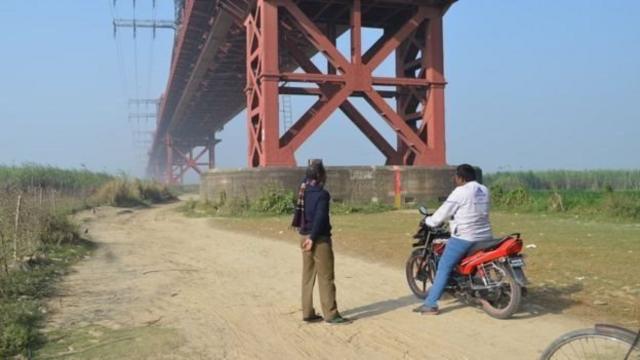
ছবির উৎস,বিবিসি বাংলা
ছবির ক্যাপশান,ফারাক্কা বাঁধের কারণে বাংলাদেশের কুষ্টিয়ার পদ্মা নদীর উপর হার্ডিঞ্জ ব্রিজের নিচ দিয়ে শুষ্ক মৌসুমে গাড়ি চলতে পারে।
বিকেল চারটার দিকে সেখানে জনসভায় বক্তব্য রাখেন মাওলানা ভাসানী। সে জনসভায় তিনি বলেন, ফারাক্কা সমস্যার সমাধানের জন্য ভারত যদি বাংলাদেশের মানুষের দাবি উপেক্ষা করে তাহলে ভারতীয় পণ্য বর্জনের আন্দোলন শুরু হবে।
হাসান মীর বলেন, "তিনি বাড়তি কোন ঝুঁকি নিতে চাননি বলে মিছিলকারীদের সীমান্তের কাছে যেতে নিষেধ করেন। আর এভাবেই মাওলানা ভাসানীর ঐতিহাসিক ফারাক্কা লংমার্চের সমাপ্তি ঘটে।"
ফারাক্কা লং মার্চের পর থেকে মাওলানা ভাসানীর শারীরিক অবস্থার অবনতি হতে থাকে। তখন থেকে মাওলানা ভাসানীর বেশিরভাগ দিন কেটেছে হাসপাতালে চিকিৎসার জন্য।
অগাস্ট মাসের মাঝামাঝি চিকিৎসার জন্য তাকে লন্ডন নিয়ে যাওয়া হয়।
উনিশশো ছিয়াত্তর সালের ১৭ ই নভেম্বর ঢাকা মেডিকেল কলেজ ও হাসপাতালে মাওলানা ভাসানীর মৃত্যু হয়।
বিকেল চারটার দিকে সেখানে জনসভায় বক্তব্য রাখেন মাওলানা ভাসানী। সে জনসভায় তিনি বলেন, ফারাক্কা সমস্যার সমাধানের জন্য ভারত যদি বাংলাদেশের মানুষের দাবি উপেক্ষা করে তাহলে ভারতীয় পণ্য বর্জনের আন্দোলন শুরু হবে।
হাসান মীর বলেন, "তিনি বাড়তি কোন ঝুঁকি নিতে চাননি বলে মিছিলকারীদের সীমান্তের কাছে যেতে নিষেধ করেন। আর এভাবেই মাওলানা ভাসানীর ঐতিহাসিক ফারাক্কা লংমার্চের সমাপ্তি ঘটে।"
ফারাক্কা লং মার্চের পর থেকে মাওলানা ভাসানীর শারীরিক অবস্থার অবনতি হতে থাকে। তখন থেকে মাওলানা ভাসানীর বেশিরভাগ দিন কেটেছে হাসপাতালে চিকিৎসার জন্য।
অগাস্ট মাসের মাঝামাঝি চিকিৎসার জন্য তাকে লন্ডন নিয়ে যাওয়া হয়।
উনিশশো ছিয়াত্তর সালের ১৭ ই নভেম্বর ঢাকা মেডিকেল কলেজ ও হাসপাতালে মাওলানা ভাসানীর মৃত্যু হয়।
ভারত কেন ফারাক্কা বাঁধ নির্মাণ করেছিল?
পলিমাটি জমে কলকাতা বন্দরের গভীরতা কমে যাওয়ায় কারণে বাংলাদেশের সীমান্ত থেকে ১৮ মাইল উজানে মনোহরপুরের কাছে ফারাক্কা বাঁধ নির্মাণ করে ভারত।
এই প্রকল্পের উদ্দেশ্য ছিল পশ্চিমবঙ্গের ভাগীরথী নদীতে পানি প্রবাহ বাড়ানো। সেজন্য গঙ্গা নদী থেকে বিপুল পরিমাণ পানি ভাগীরথী-হুগলী নদীতে নিয়ে যাওয়া হয়।
যাতে করে সেখানে জমে থাকা পলিমাটি পানিতে ভেসে যায় এবং কলকাতা বন্দরের গভীরতা বজায় থাকে।
উনিশশো চুয়াত্তর সালে বাংলাদেশ ও ভারতের প্রধানমন্ত্রী এক বৈঠকে একমত হন যে শুষ্ক মৌসুমে পানি ভাগাভাগির বিষয়ে দুই দেশ একটি চুক্তিতে না পৌঁছানো পর্যন্ত ফারাক্কা বাঁধ চালু করা হবে না।
কিন্তু ভারত সে কথা রাখেনি। উনিশশো পঁচাত্তর সালের শুরুর দিকে ভারত বাংলাদেশকে জানায় যে ফারাক্কা বাঁধের ফিডার ক্যানেল পরীক্ষা করা প্রয়োজন।
পঁচাত্তরের সালের ২১ শে এপ্রিল থেকে মাত্র ১০ দিনের জন্য এটি পরীক্ষার কথা বলেছিল ভারত। এতে বাংলাদেশ রাজী হয়। কিন্তু এরপরেও ভারত একতরফাভাবে গঙ্গানদীর গতি পরিবর্তন করে।
শেষ পর্যন্ত ১৯৯৬ সালে ২১ বছর পর আওয়ামী লীগ সরকার ক্ষমতায় ফিরে এলে গঙ্গার পানি বণ্টন চুক্তি সাক্ষরিত হয়।
এর আগে বিভিন্ন সরকারের সময় বিষয়টি জাতিসংঘসহ বিভিন্ন ফোরামে উত্থাপন করে ভারতের উপর আন্তর্জাতিক চাপ সৃষ্টির চেষ্টা করা হয়। কিন্তু তাতে খুব একটা লাভ হয়নি।
ছিয়ানব্বই সালে পানি বণ্টন চুক্তি সাক্ষরের পরেও অভিযোগ রয়েছে, শুষ্ক মওসুমে ভারত চুক্তি অনুযায়ী বাংলাদেশকে পানি দেয় না।
এই প্রকল্পের উদ্দেশ্য ছিল পশ্চিমবঙ্গের ভাগীরথী নদীতে পানি প্রবাহ বাড়ানো। সেজন্য গঙ্গা নদী থেকে বিপুল পরিমাণ পানি ভাগীরথী-হুগলী নদীতে নিয়ে যাওয়া হয়।
যাতে করে সেখানে জমে থাকা পলিমাটি পানিতে ভেসে যায় এবং কলকাতা বন্দরের গভীরতা বজায় থাকে।
উনিশশো চুয়াত্তর সালে বাংলাদেশ ও ভারতের প্রধানমন্ত্রী এক বৈঠকে একমত হন যে শুষ্ক মৌসুমে পানি ভাগাভাগির বিষয়ে দুই দেশ একটি চুক্তিতে না পৌঁছানো পর্যন্ত ফারাক্কা বাঁধ চালু করা হবে না।
কিন্তু ভারত সে কথা রাখেনি। উনিশশো পঁচাত্তর সালের শুরুর দিকে ভারত বাংলাদেশকে জানায় যে ফারাক্কা বাঁধের ফিডার ক্যানেল পরীক্ষা করা প্রয়োজন।
পঁচাত্তরের সালের ২১ শে এপ্রিল থেকে মাত্র ১০ দিনের জন্য এটি পরীক্ষার কথা বলেছিল ভারত। এতে বাংলাদেশ রাজী হয়। কিন্তু এরপরেও ভারত একতরফাভাবে গঙ্গানদীর গতি পরিবর্তন করে।
শেষ পর্যন্ত ১৯৯৬ সালে ২১ বছর পর আওয়ামী লীগ সরকার ক্ষমতায় ফিরে এলে গঙ্গার পানি বণ্টন চুক্তি সাক্ষরিত হয়।
এর আগে বিভিন্ন সরকারের সময় বিষয়টি জাতিসংঘসহ বিভিন্ন ফোরামে উত্থাপন করে ভারতের উপর আন্তর্জাতিক চাপ সৃষ্টির চেষ্টা করা হয়। কিন্তু তাতে খুব একটা লাভ হয়নি।
ছিয়ানব্বই সালে পানি বণ্টন চুক্তি সাক্ষরের পরেও অভিযোগ রয়েছে, শুষ্ক মওসুমে ভারত চুক্তি অনুযায়ী বাংলাদেশকে পানি দেয় না।
Saif
Senior Member
- Joined
- Jan 24, 2024
- Messages
- 16,790
- Likes
- 8,152
- Nation

- Residence

- Axis Group

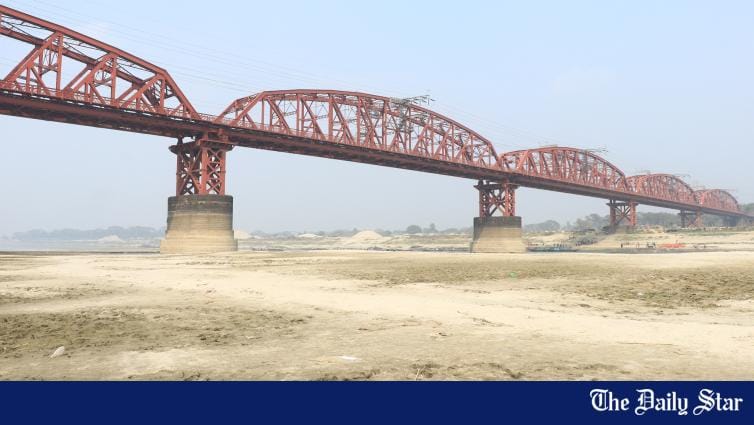
Our dying Padma
The mighty Padma now lies as a pale imitation of its former self. Depletion in the flow of water from upstream, along with deposition of silt, has choked the riverbed, rendering it nearly unrecognisable.
Our dying Padma
Poor upstream flow turns the river dry, farmers and fishers in trouble

The mighty Padma now lies as a pale imitation of its former self. Depletion in the flow of water from upstream, along with deposition of silt, has choked the riverbed, rendering it nearly unrecognisable.
The mighty Padma now lies as a pale imitation of its former self. Depletion in the flow of water from upstream, along with deposition of silt, has choked the riverbed, rendering it nearly unrecognisable.
"Due to poor discharge of water at Farakka Point, water flow reduced by 10-20 thousand cusecs at Hardinge Bridge point in last couple of months. The poor upstream flow, alongside poor rainfall, is drying up the river alarmingly."
— Md Rezaul Karim Executive engineer, Department of Hydrology
The depletion of its flow along with the lack of rainfall has exposed vast stretches of the riverbed, where millions of tonnes of silt accumulate every year. The water in the river is now visible for only three to four months. The remaining eight to nine months see the water level plummet to its lowest point, revealing miles of sandy char lands across the river's expanse.
The mighty Padma, is now dying. Where boats and even big ships used to cruise once has now become crop fields at some places, while being turned into narrow ponds scattered across riverbeds in other places.
"I have never seen Padma dried up so much before," said Md Chand Ali, 50, a fisherman of Pakshey village under Pabna's Ishwardi upazila.
"Earlier, even during dry season, I could catch at least 3-4 kilogrammes of fish daily. Now, catching barely 1kg of fish is difficult due to poor water flow in the river," he said.
The river is completely dry across the area under the Hardinge Bridge, while huge number of shoals have emerged everywhere, Chand Ali added. Other fishermen from the area echoed him.
According to hydrology experts, the mighty Padma dried up significantly this year due to poor water flow from upstream, adversely affecting the livelihoods of hundreds of fishermen from the areas adjoining the river.
Irrigation has been badly affected as the operation of pumps of the Ganges-Kobadak project has remained suspended due to poor flow.
"We need a minimum water level of 4.5-metre for pump operation in the G-K project. The water level was more than 5-metre around this time last year. At present, the water level is at 4.07-metre which is inadequate, disrupting the country's biggest irrigation project," said Md Abdul Hamid, director of G-K project.
The three main pumps, which have been providing irrigation water for 96,000 hectares of agricultural land in the southern districts, are yet to resume operation this year, while subsidiary pumps have been out of services since 2002 for technical faults, he added.
Bangladesh reportedly got a poor supply of water in the first couple of months this year as per the Ganges Water Sharing Treaty due to poor flow of water at Farakka Point, said Md Rezaul Karim, executive engineer of Department of Hydrology, Pabna division.
According to the Joint Rivers Commission report, the flow of water at Hardinge Bridge point recorded at each 10-day cycle between January 1 and March 10 this year were 63,113 cusecs, 48,518 cusecs, 48,359 cusecs, 43,926 cusecs, 34,697 cusecs, 35,751 cusecs and 36,818 cusecs.
Around the same time in 2023, the figures recorded in the JRC report were 85,316 cusecs, 70,827 cusecs, 69,990 cusecs, 67,364 cusecs, 59,376 cusecs, 47,891 cusecs and 42, 372 cusecs.
"Due to poor discharge of water at Farakka Point, water flow reduced by 10-20 thousand cusecs at Hardinge Bridge point in the last couple of months. The poor upstream flow, alongside poor rainfall, is drying up the river alarmingly," Rezaul Karim also said.
According to the Ganges Water Sharing Treaty, both Bangladesh and India will get 50 percent share of water if the available water level at Farakka Point is 70,000 cusecs or less. If the level is 70-75 thousand cusecs, Bangladesh will get minimum 35,000 cusecs and India will get the rest. If the level is 75,000 cusecs or more, then India will get a minimum of 40,000 cusecs and Bangladesh will get the rest.
Both Bangladesh and India will surely get a minimum 35,000 cusecs water from March 11 till May 10, according to the treaty.
Experts, however, opined that the treaty should be reshuffled considering the present perspective of the river's water flow.
